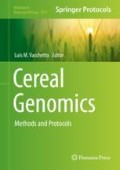Abstract
Cereal improvement is based upon effective utilization of genetic resources. These include germplasm and genomics data and tools. Cereal germplasm is available from major global seed banks. Wild material remains an additional less well utilized resource. Sourcing of germplasm requires protocols to ensure intellectual property matters are adequately addressed. Advances in genomics technology have made extensive data set available for the cereals. Reference genome sequences, transcriptome resources, and pan genomes are now available for the major cereal species. The use of genomic data is facilitated by the addition of user-friendly interfaces that allow breeders to access the information they need.
Access this chapter
Tax calculation will be finalised at checkout
Purchases are for personal use only
References
Henry RJ (2017) Plant genetic resources. In: Hunter D, Guarino L, Spillane C, McKeown P (eds) Routledge handbook of agricultural biodiversity. Routledge, London, pp 15–29
Wambugu P, Ndjiondjop M-N, Henry RJ (2018) Role of genomics in promoting the utilization of plant genetic resources in genebanks. Brief Funct Genomics 17:198–206
International Wheat Genome Sequencing Consortium (2018) Shifting the limits in wheat research and breeding using a fully annotated reference genome. Science 361:eaar7191
Wang W, Mauleon R, Hu Z et al (2018) Genomic variation in 3010 diverse accessions of Asian cultivated rice. Nature 557:43–49
Stein JC, Yu Y, Copetti D et al (2018) Genomes of 13 domesticated and wild rice relatives highlight genetic conservation, turnover and innovation across the genus Oryza. Nat Genet 50(2):285–296. https://doi.org/10.1038/s41588-018-0040-0
Mascher M, Gundlach H, Himmelbach A et al (2017) A chromosome confirmation capture ordered sequence of the barley genome. Nature 544:427–436
Jiao Y, Peluso P, Shi J et al (2017) Improved maize reference genome with single-molecule technologies. Nature 546:524–527
McCormick RF, Truong SK, Sreedasyam A et al (2018) The Sorghum bicolor reference genome: improved assembly, gene annotations, a transcriptome atlas and signatures of genome organization. Plant J 93:338–354
Golicz AA, Batley J, Edwards D (2016) Towards plant pangenomics. Plant Biotechnol J 14:1099–1105
Yao W, Li GW, Zhao H et al (2015) Exploring the rice dispensable genome using a metagenome-like assembly strategy. Genome Biol 16:187
Zimin AV, Puiu D, Hall R et al (2017) The first near-complete assembly of the hexaploid bread wheat genome, Triticum aestivum. Gigascience 6:1–7. https://doi.org/10.1093/gigascience/gix097
Luo MC, Gu YQ, Puiu D et al (2017) Genome sequence of the progenitor of the wheat D genome Aegilops tauschii. Nature 551:498–502
Alaux M, Rogers J, Letellier T et al (2018) Linking the International Wheat Genome Sequencing Consortium bread wheat reference genome sequence to wheat genetic and phenomic data. Genome Biol 19:111
Rangan P, Furtado A, Henry RJ (2017) The transcriptome of the developing grain: a resource for understanding seed development and the molecular control of the functional and nutritional properties of wheat. BMC Genomics 18:766
Kawahara Y, de la Bastide M, Hamilton JP et al (2013) Improvement of the Oryza sativa Nipponbare reference genome using next generation sequence and optical map data. Rice 6:4
Zhao Q, Fen Q, Lu H et al (2018) Pan-genome analysis highlights the extent of genomic variation in cultivated and wild rice. Nat Genet 50:278–284
Gutierrez-Gonzalez JJ, Tu ZJ, Gravin DF (2013) Analysis and annotation of the hexaploid oat seed transcriptome. BMC Genomics 14:471
Author information
Authors and Affiliations
Corresponding author
Editor information
Editors and Affiliations
Rights and permissions
Copyright information
© 2020 Springer Science+Business Media, LLC, part of Springer Nature
About this protocol
Cite this protocol
Henry, R.J. (2020). Cereal Genomics Databases and Plant Genetic Resources in Crop Improvement. In: Vaschetto, L. (eds) Cereal Genomics. Methods in Molecular Biology, vol 2072. Humana, New York, NY. https://doi.org/10.1007/978-1-4939-9865-4_2
Download citation
DOI: https://doi.org/10.1007/978-1-4939-9865-4_2
Published:
Publisher Name: Humana, New York, NY
Print ISBN: 978-1-4939-9864-7
Online ISBN: 978-1-4939-9865-4
eBook Packages: Springer Protocols

